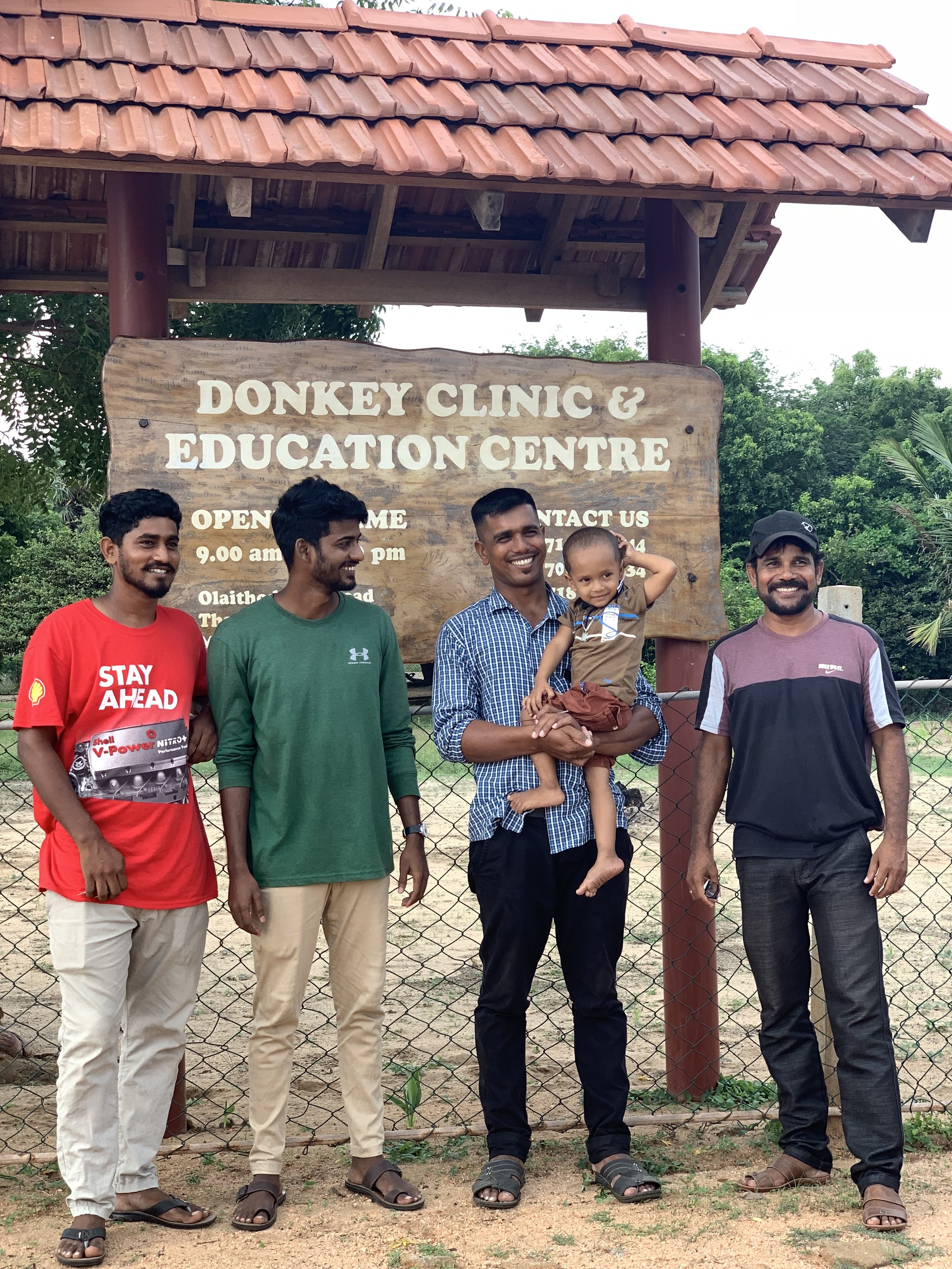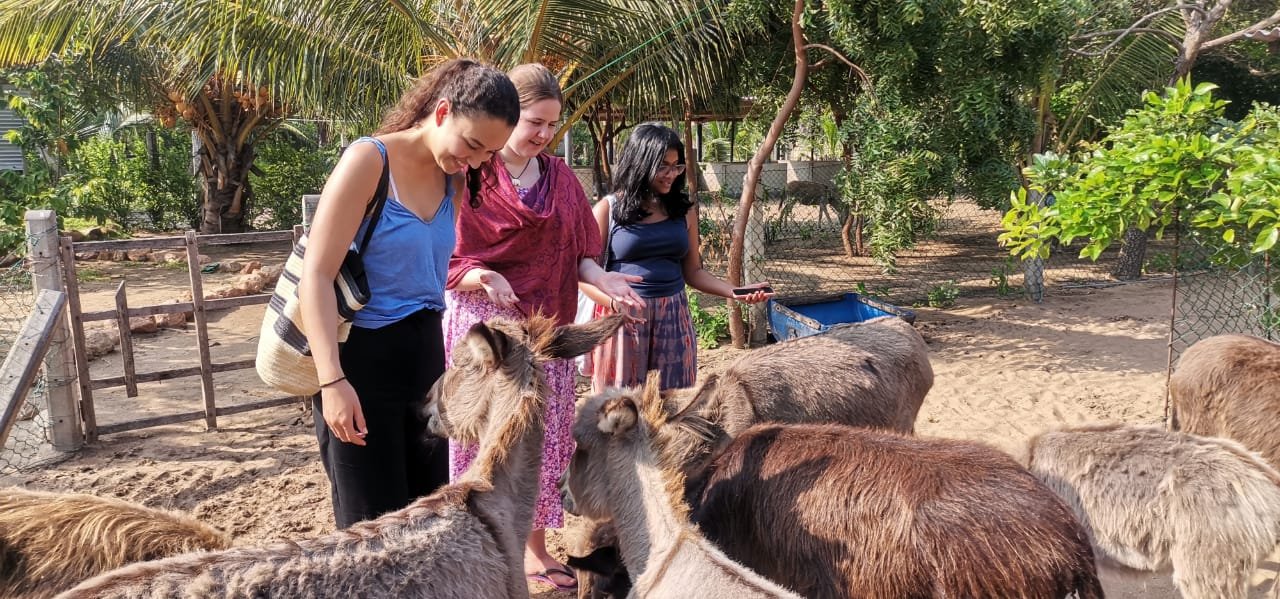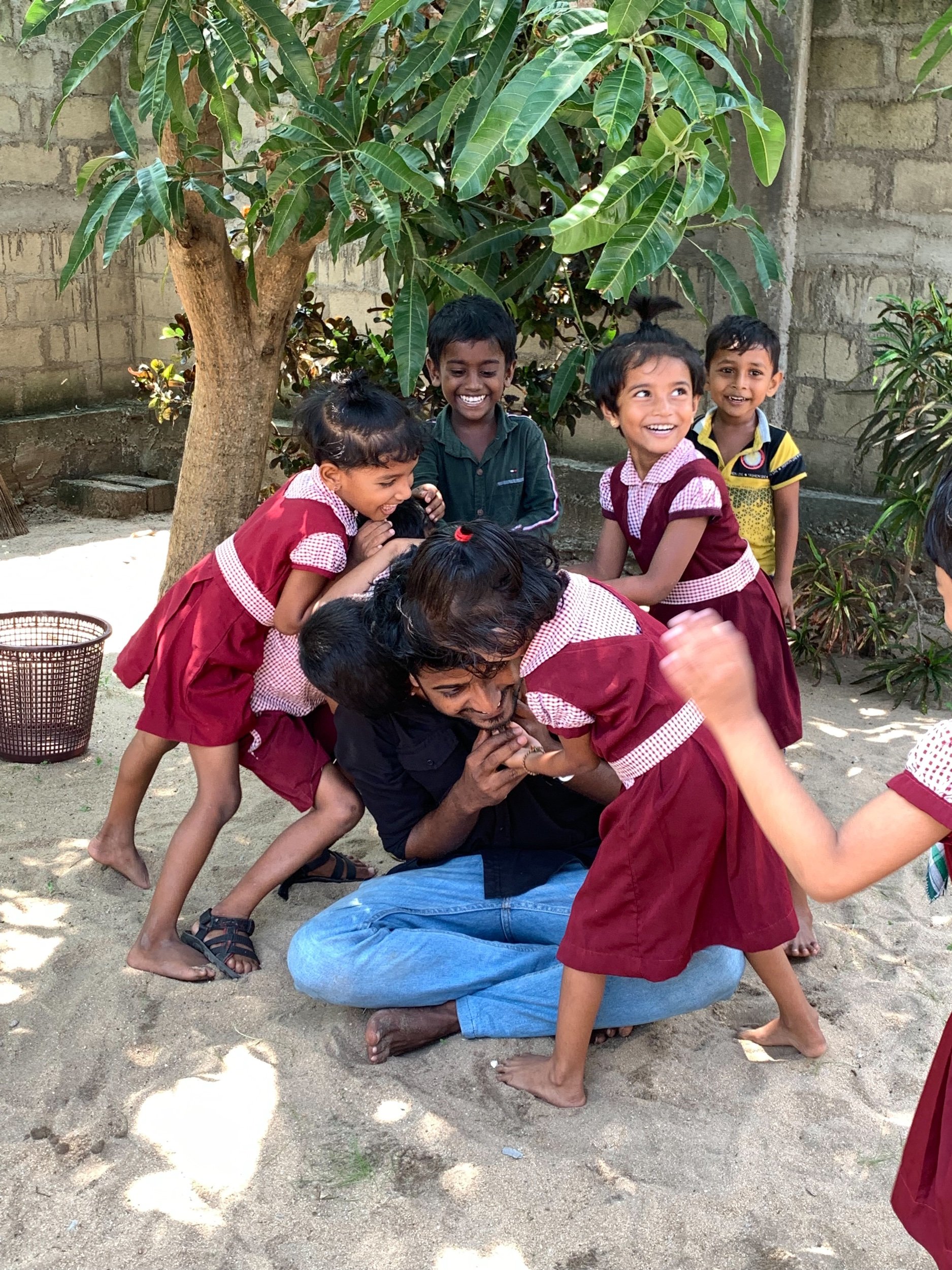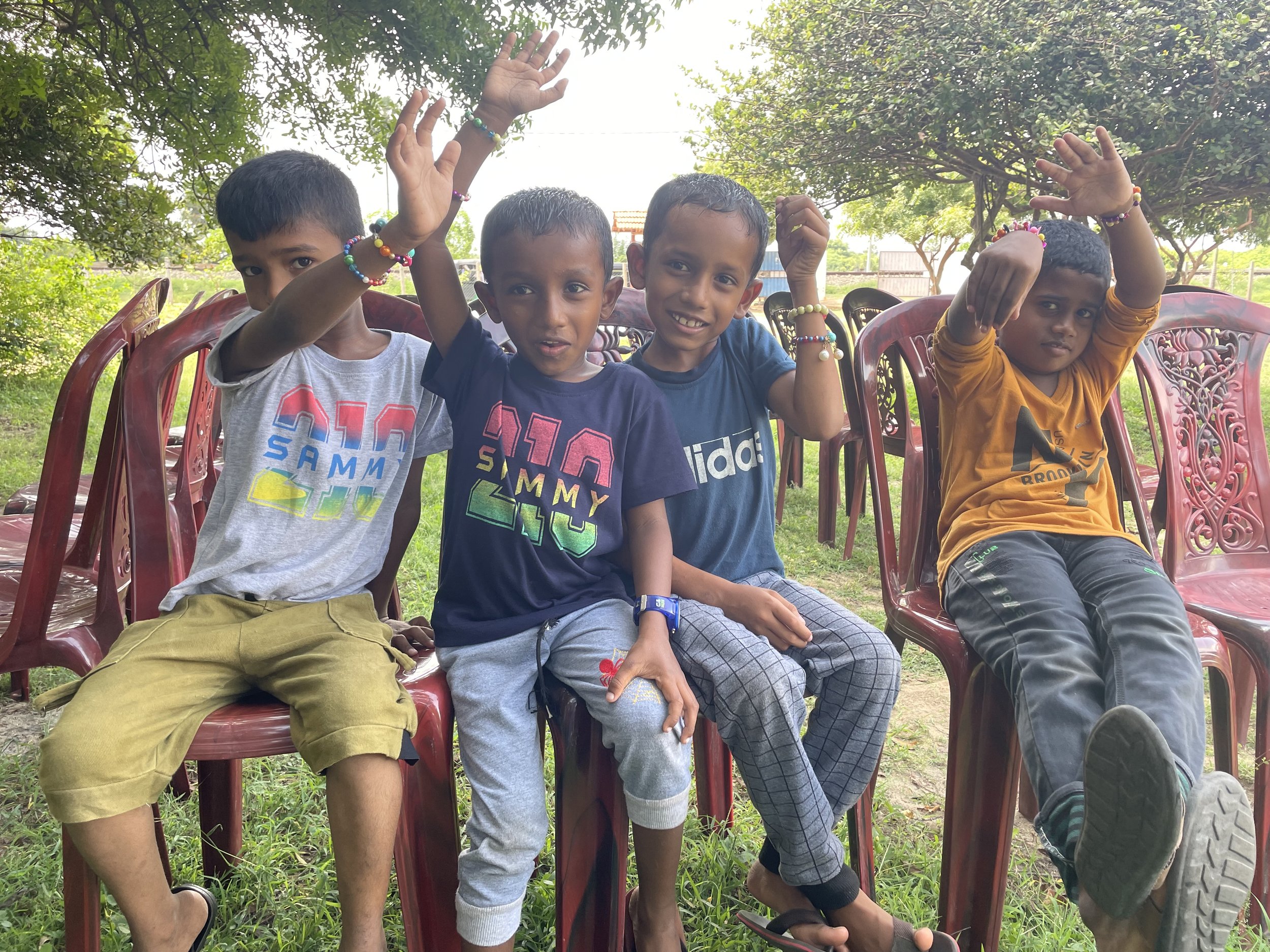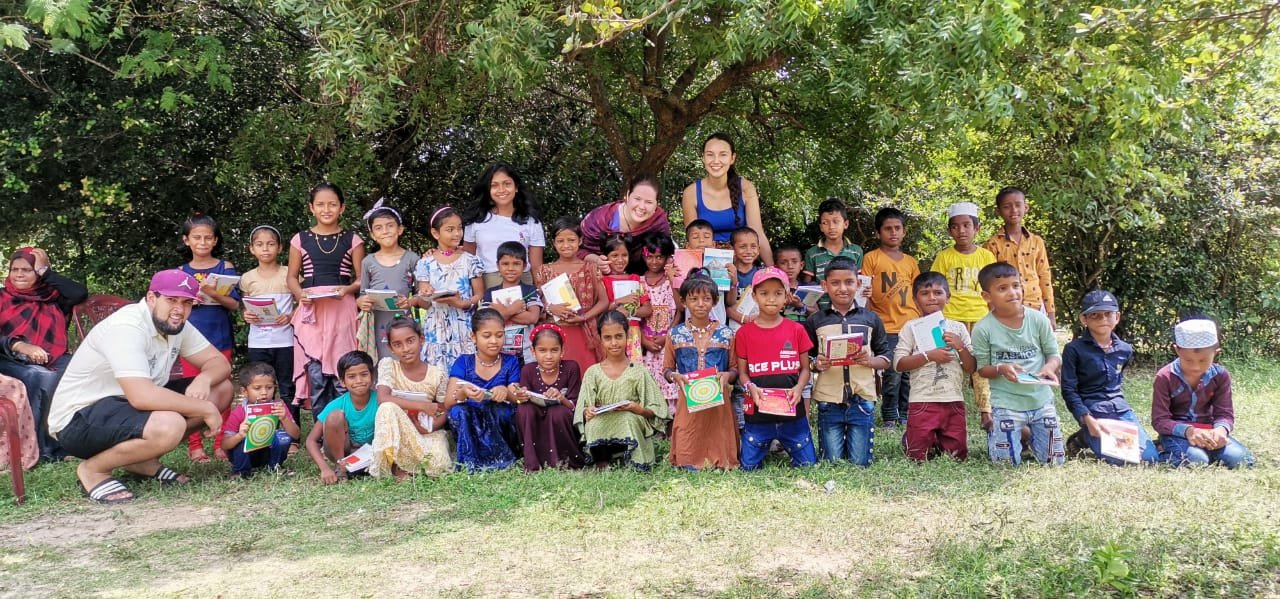Our Journey to Mannar
Author: Ashwini Karunathilaka
Editor: Elisah Sauerbier, Kintan van Leeuwen
Our trip to Mannar started on the 25th of October at roughly 9:30 am. I had only started volunteering for the Little Leaders Foundation (LLF) two months before this trip so meeting Elisah and Kintan, two people from across the world was nerve-wracking in itself but thinking about the trip to Mannar made me even more anxious. I had never visited Mannar and to be frank, I hadn’t even heard about this part of Sri Lanka, despite living here for the past 21 years of my life. That was my first lesson on this trip.
I was already made aware that Mannar was one of the poorest states in Sri Lanka and that it had a gruesome past due to the civil war. However, I tried my best to not have any preconceived notions about Mannar and go into this trip with a clean slate and an open mind.
After a long drive from the south to the northwest, we arrived in Mannar town by sunset. It became clear that the civil war had a huge impact on the community. As we drove by unfinished buildings; especially houses, it appeared as if people started building their lives but stood up and left to flee the danger zones during times of war. We also came across more donkeys than humans and it showed little signs of tourism with barely any restaurants or hotels around the town.
Meeting our partnering NGO, Bridging Lanka
The next day was our first official work day and we were up by 8 am. All of us, Kintan, Elisah Abdu, and I were full of excitement and eager to meet the team at Bridging Lanka, our partnering NGO. We collaborated with them on the construction of a holistic preschool in Mannar, Little Trees Nurtury. While there was an ample amount of excitement amongst all of us, it was coupled with some nervousness as well! I had never been on a fieldwork trip as such, so I had little to no experience and that made me even more concerned about how the next few days would go.
Once we arrived at the Donkey Clinic and Education Center run by Bridging Lanka, we were introduced to the team members and I distinctively remember feeling like an imposter who did not deserve a seat at the table with such great, intellectual, and wise people.
We started our day with a presentation conducted by Kumanan, a member of Bridging Lanka to brief us on their ongoing projects. They touched on several social issues but the one that stuck with all of us the most throughout the trip was how drugs have seeped into the lives of children in Mannar. It was both horrifying and distressing to learn that most children do not possess basic reading and writing skills such as spelling their name but they do know how to smuggle drugs unannounced. Mannar is one of the key points in Sri Lanka for drug trafficking and when pushed into a corner with a lack of financial stability, drugs have offered an unhealthy escape from their worries. Due to no fault of their own, children have been stripped of their innocence once again.
We also came to learn how the 26-year-long civil war disrupted the social atmosphere of the community dissolving any sense of unity among the religions. It was clear to see that even though 13 years have passed by, the grief, despair, and disharmony are still apparent within the community. The generational trauma has thus impacted the well-being of children in Mannar today as most parents are still living in “crisis mode” hindering their ability to show love towards their children. This is one of the issues Bridging Lanka is trying to eliminate by focusing on programs that educate adults about the five love languages and how to best cater to their children. While I lived in the same country all my life, I was never old enough to understand the civil war when it happened. To see parents and children younger than me living in such harsh conditions, while bearing the trauma that came with the civil war even now, was hard for me to grasp.
As an NGO, Bridging Lanka works together with the community of Mannar by executing research and listening deeply to the community’s wishes before drafting a plan for any project. They do this to make sure their support aligns with the people they’re trying to help. Therefore, I must commend the team at Bridging Lanka for the many projects they have put forth with the drive of uniting and healing the community of Mannar, however difficult it may be.
We also visited a few projects by Bridging Lanka and seeing the effort they make gave rise to another layer of profound respect towards these individuals and the work they do. Their motto remains “With heart, head, and hand” and it is crystal clear that the team has the biggest hearts I have ever come across. In a world filled with so many materialistic desires, it was almost unreal to find people who lead with their hearts on their sleeves and focus on bettering their society.
Afterwards, we visited the root of our organization’s passion, the preschool Little Trees Nurtury. Wathmi, the architect of the preschool and volunteer of LLF, showed us around as she explained her vision for the preschool. She explained that she designed the preschool while looking from a child’s point of view and wanted to incorporate fun and playfulness into education. I was amazed by how much was already done and it was clear that the construction could be completed sooner than expected if all goes well.
Despite the economic crisis and the hardships that have arisen due to it, the team has been tirelessly working to keep their eye on the goal and is determined to see the project through. The design is carefully articulated and preserved the one thing that the people of Mannar value the most, the Palymrah tree. Wathmi explained that the Palmyrah tree connects all three religions in Mannar and therefore forms the spiritual centre of the preschool. This way children from each religion can have space to do their morning prayers.
Growing up in Colombo which is one of the busiest cities in the country, I did not understand the value of nature, so to see that an entire school was built while still protecting the beautiful environment was amazing. Even though I had only joined this cause recently, I felt honoured to be a part of a project that strives to inspire and educate children and in return give them a chance at a better life than expected.
At the end of the first day, Alhatir, the manager of Bridging Lanka’s well-known Donkey Clinic and Education Centre, gave us a presentation about the clinic. Mannar was one of two places in the whole of Sri Lanka that is home to a huge population of donkeys. Unfortunately, animal abuse is common in this area as the presence of the donkeys is not appreciated. Bridging Lanka's Donkey Clinic takes in injured or sick donkeys to treat and care for them. For most of us, donkeys are used in correlation with adjectives like idiot and fool because society has portrayed them in this way. Therefore, when Bridging Lanka started the clinic, they were mocked and not taken seriously by the community of Mannar, but this did not stop them from carrying out their work. Bridging Lanka focused on donkey-assisted therapy, which sounded odd at first but seeing them in real life made me realize how adorable these animals are and how much happiness these donkeys bring to people in Mannar.
Visiting preschools in nearby villages
Our second day of work consisted of visiting two preschools within the area to conduct more research on the community’s issues with preschool education and get a clearer picture of the difficulties teachers and students face in the education system. With our solution-oriented mindset, these insights could give us fruit for thought on how we can implement solutions for these problems within our preschool as well.
Growing up in Sri Lanka, I have heard about and even come across schools in many other areas that lacked the necessities but seeing the conditions in which these preschools operate still came as a surprise to me. Having volunteered before in a preschool, I noticed how much they prioritized hygiene and health; two things that were heavily absent throughout the schools we visited.
We were told that children had to bring a water bottle from home that they used for both drinking and when they had to use the washroom, as the schools had inadequate bathroom facilities. In terms of overall health, there was a lack of knowledge among the teachers on how to care for a child’s physical and mental health. When asked, the teachers mentioned that the only health training they received was regarding COVID-19. While learning to protect children from the virus is a step in the right direction; training on how to handle a child when he/she is choking for example is still untouched. Given the lack of hospitals around the village and no immediate means of travelling, this can have damaging consequences.
Although mental health is a topic that has been gaining more momentum over the years, in Sri Lanka, it is still undervalued and overall a taboo topic. In relation to improving mental health among children, it is neglected and more often than not laughed at too. During my school years, mental health was never discussed openly. Even at later stages in life, people do not seem to understand the grave importance of fostering good mental health from early on. After pursuing psychology as my major, I soon came to realize that good mental health has a direct correlation with the emotional development of a child. I believe the first few years of a child’s life are the most important as it lays the groundwork for their future. Especially because of the hardships the community of Mannar has faced, it is vital to guide teachers and introduce psychological interventions to help them.
However, despite the pressure put on teachers by the government to produce high-quality results in such unfortunate circumstances, they showed resilience and sincerity while carrying out their day-to-day work. I have always admired the time and effort teachers put in as they are educating children and guiding them the best they can, but, to hear that most of the teachers in these preschools have not received their salary which is a maximum of Rs.6000 (15.97 EUR) from the government is not only unethical but heartbreaking to hear. They deserve more praise and acknowledgement than what they are getting right now. I must say though the children displayed so much love and joy during our visit and it made me realize it does not take much to make a child happy but they do deserve better than what they have now. At the minimum, they deserve to have the same opportunities as others do, most importantly, a safer environment.
Unforgettable moments of the work trip
This trip opened our eyes to how dire the situation is in Mannar but it had many inspiring moments for us too.
One morning while we were waiting for a TukTuk, an employee from the hotel spoke to us, and out of his curiosity, he wanted to know why we were on Mannar island, out of all the places in Sri Lanka. To which I replied that we are building a preschool right here in his village, Puthukkudiyiruppu. The smile that appeared on his face was indescribable, he began to thank us for helping his village out and that moment made me realize how much this school would impact their community for the better.
Another instance was during our meeting with the mosque committee. Mannar consists of a Muslim majority, therefore it was important we met them to convey our organization’s intentions and more importantly to have an open-ended discussion. As we were briefed earlier that the communities are not as united as they were before, we were slightly worried that there might be objections towards our idea to create a preschool where children from all religions are welcome. However, toward the end of the discussion, the head of the committee stated “there is no division in education”. This warmed our hearts because it showed that we can put our differences aside to help all children have a better shot at life.
Finally, on our last day, we organized activities which included making bracelets and doing a dance activity called musical chairs. When we proposed that we wanted children from all three communities to join us on our last day, the team at Bridging Lanka was rather hesitant because it was almost unheard of. However, we were determined to make that happen and it was quite a bold move on our part. Finally, children from all three religions came together in one place to enjoy each other’s company and that was one of our biggest achievements. To see that children viewed the world through an unfiltered, almost rose-coloured lens was refreshing to see and it showed us how much we need to protect that. Children in Mannar indeed grow up faster than most of us had to, but to see that their innocence was still intact made me hopeful that we might still have a chance in helping develop them to be the little leaders of the next generation.
Final thoughs
I have so much gratitude for my childhood as I am here right now because of the foundation I was privileged enough to receive and I believe we are meant to live this life by giving back to those who are in need. Not to mention the fact that I was able to connect with two incredible individuals like Kintan and Elisah from across the world to work towards a common goal; helping others, is something we at Little Leaders and myself personally take very seriously.
My biggest goal for this year was to get out of my comfort zone, therefore diving into this trip despite every part of me wanting to crawl back into my introverted corner was hard. However, this experience has helped me both professionally and personally, and will definitely be one for the books. This trip gave me a glimpse of what more we can achieve and how much there is left to do, but I am certain that along with the incredible associations we have made throughout our trip, we have created the ideal dream team. I realized the importance of human connections and relationships and how much we all need one another. Being vulnerable and showing empathy are not weaknesses, instead, they are two of the biggest strengths an individual can have in this life.
The day we left, I felt a sense of hope and I think that’s one thing the people in Mannar need the most; hope.


